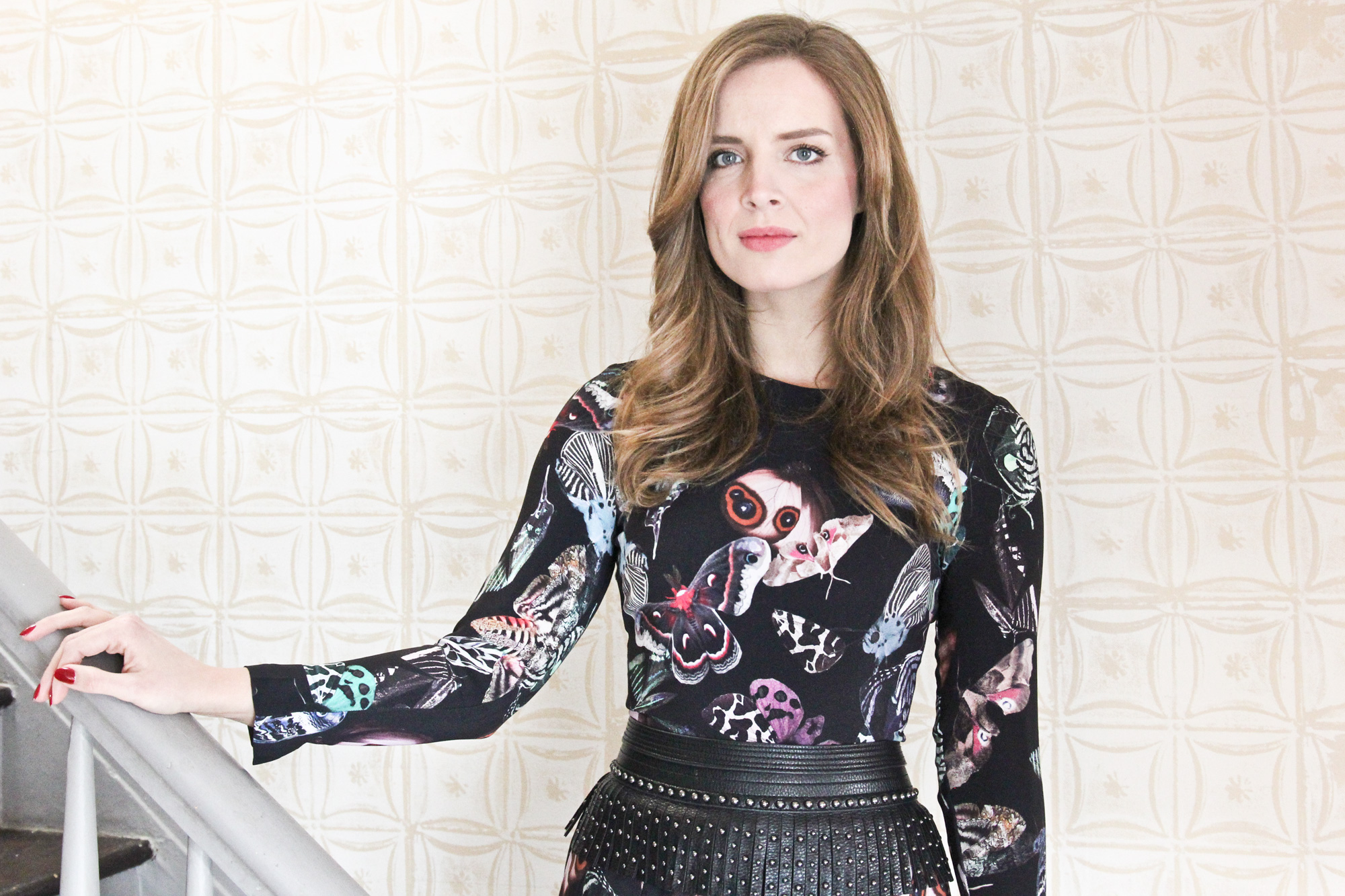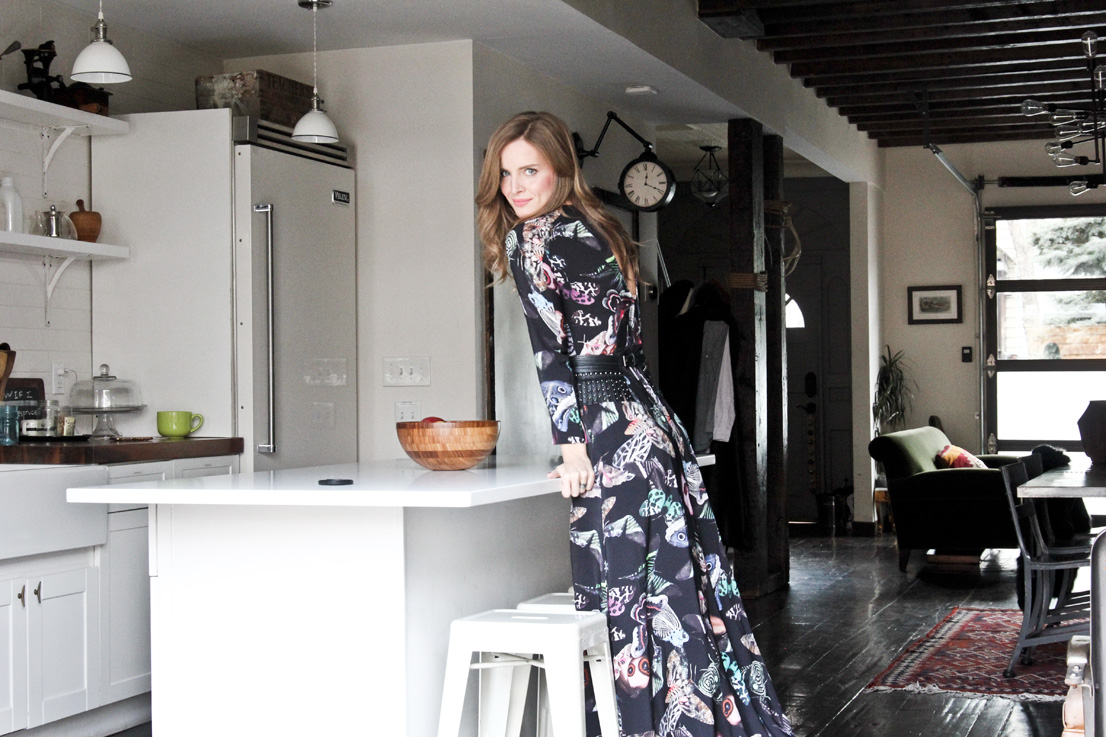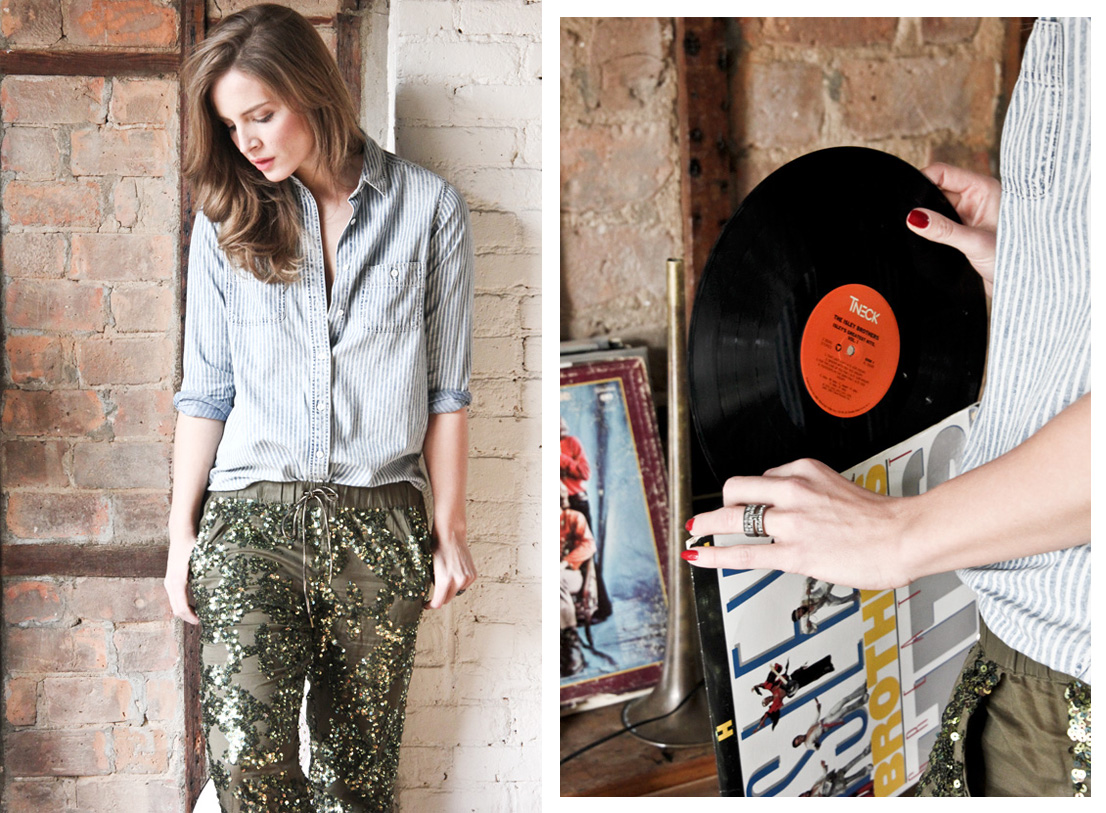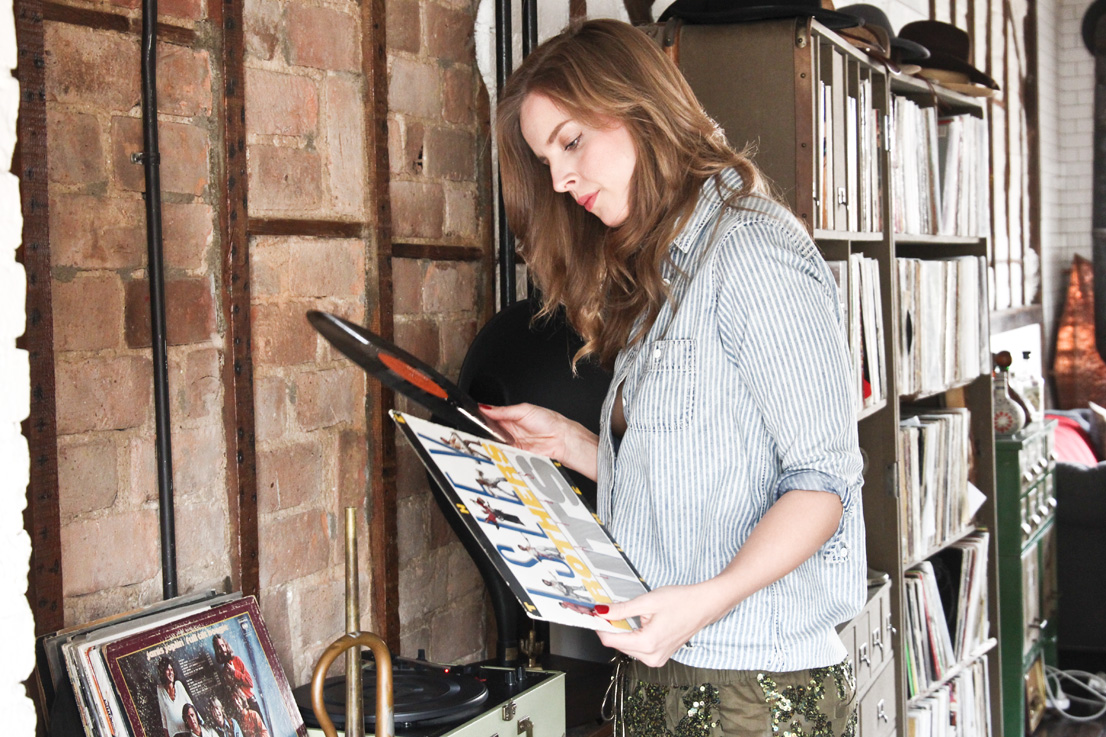Let us set the scene for a second: picture a room that looks like an art-directed version of a country guesthouse filled with vintage paraphernalia. You know, decades-old bottles, prints, filing cabinets, trucks and trinkets picked up over the years. There are giant wooden beams, antler chandeliers, oh, and a real log burning stove too. At the far side of the room, close to the raised garage door that leads into the open plan living space, Alex Merrell is working her magic on a vinyl player talking music. We’re in the heart of Williamsburg, Brooklyn at one of her favourite spots, the Urban Cowboy B&B, a stone’s throw away from her New York home.
For the uninitiated, Alex is quite the sought after DJ and interestingly, part of a growing crop of women making waves in an industry highly saturated and typically associated with men. Don’t be fooled though. She’s no newbie. In fact, she’s spent the past decade honing and mastering her trade, crafting sets that get crowds moving everywhere from her native Vancouver to Los Angeles, New York, Miami and Morocco. She’s constantly on the move and lives her life out of a suitcase, which is how she came up with the idea for her new business, TREC – an app that maps where your friends are in the world to allow you to create and view socially curated city guides. Travelling to New York in a couple of months? You’ll be able to see if anyone you know will be there at the same time and if not, you can still access the spots they hit up when they’re in town. No brainer, right?
Read on to find out more about Alex’s story – not only will you learn what it’s like to be an on-the go pro, she’s talking all about mastering the art self promotion, why losing a job isn’t always a bad thing and why you need relentlessness to get to where you want to go.
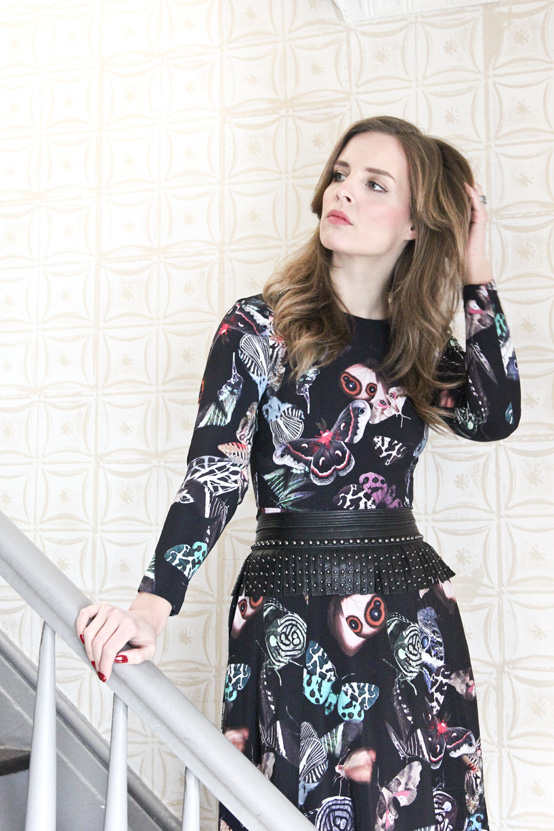 I was extremely fortunate to grow up around creatives and entrepreneurs because it made me aware those career choices existed. I saw people around me gaining success doing things they were passionate about, which allowed me to focus first on figuring out what I loved, and then on how to make money doing it. I wouldn’t be happy doing something just for the paycheck, so it was invaluable to know that early on and start my path own from that perspective. I decided I needed to work in music during a Rolling Stones show when I was 18, and figured the smartest move was to start on the business side. Funnily enough, my first love actually wasn’t music, though. It was theater, which I did from the time I was five until I was eighteen. I got used to the rush of nerves before you walk onstage and the fact that you only have one shot at making an audience feel how you want them to feel. I do thrive under pressure because I get bored when I’m not challenged, so having a job that is different every day suits my personality.
I was extremely fortunate to grow up around creatives and entrepreneurs because it made me aware those career choices existed. I saw people around me gaining success doing things they were passionate about, which allowed me to focus first on figuring out what I loved, and then on how to make money doing it. I wouldn’t be happy doing something just for the paycheck, so it was invaluable to know that early on and start my path own from that perspective. I decided I needed to work in music during a Rolling Stones show when I was 18, and figured the smartest move was to start on the business side. Funnily enough, my first love actually wasn’t music, though. It was theater, which I did from the time I was five until I was eighteen. I got used to the rush of nerves before you walk onstage and the fact that you only have one shot at making an audience feel how you want them to feel. I do thrive under pressure because I get bored when I’m not challenged, so having a job that is different every day suits my personality.
My parents listened to a pretty eclectic mix of music growing up and since I had two stepparents as well, it was even more diverse. I was initially drawn to hip-hop, because it was new and different from what my family listened to and from Vancouver in general, which didn’t have a strong black culture. The first tape I bought was LL Cool J’s Mr. Smith, followed by Coolio’s Gangster’s Paradise, both of which were promptly confiscated for their explicit content and, as I learned later, because my dad wanted to listen to them. I’m not necessarily known for playing hip-hop now, but it’s my favorite genre to drop late night because I find it to be the best music to dance to and it catches people off guard to see that I can go there as a DJ.
My stepmom’s best friend is [singer/songwriter] Sarah McLachlan and growing up with her as an example of a Canadian woman who was having tremendous success in the industry made me never question whether it was possible. Canadians are very kind and I think there’s a misconception that being ambitious means stepping on people’s toes, which isn’t something they want to do. There’s also a desire to stand out from homogenised mainstream American culture, but focusing too much on what you don’t want to be can get in the way of focusing on what you are. I think Canadians are learning to strengthen their voice, which is exciting for the development of our culture.
I left Canada for Los Angeles because a 19 Entertainment offered me a paid internship. I got it through a family friend and the role turned into a first assistant position within two months. For the first two years I assisted a manager, which meant backing him up by acting as air traffic control between our artists and their agents. I moved when I was 19 years old and I knew I wasn’t prepared for New York. L.A. was closer to home, cheaper and sunnier. I believe in taking calculated risks, but that’s always going to be different for everyone. I don’t know that I would move abroad without any connections or career prospects, even with money in the bank, unless I had a real incentive to be there. I have made a point to follow my dreams while also paying attention to the opportunities life has brought me, and the times it has resisted what I thought I wanted. Someone else might be able to say, “Hey! I want to move to Madrid!” and be able to build a great life there from nothing. At the end of the day, you have to trust your instincts. When I moved to L.A. I had one friend, and after six years living there I left without feeling like I’d developed many real friendships. Since leaving I’ve had a lot of dear friends move to LA so I feel differently now, but at the time it was hard. New York has been a polar opposite experience for me, and I was lucky to make incredible friends very quickly, a major advantage in a city that tests you every day.
I can handle failures as long as it’s not due to a lack of effort on my part. I’d rather takes risks and lose than grow old with a bunch of “what ifs”, but I also want to be smart with how long I pursue something if it isn’t gaining traction.
I don’t know how I had the balls to move to L.A. that young, but I’ve always had guts and been a bit of a hustler. The potential for failure paralyses a lot of people, but I went through enough in my early life to realise I was resilient enough to withstand things not working out. I have been broke, I have had my family fall apart, I have lost jobs, I have lost people I’ve loved, and all those experiences have helped me grow. I can handle failures as long as it’s not due to a lack of effort on my part. I’d rather takes risks and lose than grow old with a bunch of “what ifs”, but I also want to be smart with how long I pursue something if it isn’t gaining traction.
When the recession hit I lost my job, which was a massive blessing in disguise. This amazing man I worked with took me aside and said, “You’re the youngest person here and there will always be a desk waiting for you if you want it. Go do something creative because I know that’s where your heart is.” I took an intro to DJing course, which was a bit of a joke because there was one kid in the class who couldn’t wrap his brain around what a beat was so we were all sort of moving at that pace. DJ Mark Luv, who toured with The Pharcyde, was there one day and I asked him to start teaching me privately. I think mentorship is extremely important in DJing so you can learn technical skill. Every gig will teach you something but it’s vital to have strong technique to grow from. My first set of turntables and mixer was funded by my tax refund from the assistant position and I put the rest on a credit card. If I hadn’t had those resources, I would have found a person or a venue with equipment and bartered for time with it in exchange for my help with something else. Or baked them cookies. There’s always a way.
I didn’t assist but I made friends with a lot of DJs and would sit in the booth with them and watch them work, noticing which songs got people dancing and new transitions that sounded cool. You can only practice so much in your bedroom before you have to get out and learn to read a room. It took time to gain a strong client base but I benefited from being a good talker. I spent a summer as a telemarketer when I was 17 that set me up for being able to sell myself. Basic sales training is valuable for just about anything you do and gives you a major leg up in creative industries because most people don’t know how to market themselves properly. I managed to move from playing local hotspots around L.A. to opening for world-renowned DJs relatively quickly. I’ve always been driven but I needed to be because I didn’t have another source of income to fall back on. You just have to keep putting yourself out there and know that you’re going to be shot down 99 times before you land an opportunity. I got an international tour with an artist from sending a tweet once. Talent is vital but it’s the passenger, not the vehicle. You need relentlessness to get you where you want to go.
The process of working for a set definitely lies in being prepared but also about being ready to throw your preparation out of the window if the crowd or the client is feeling a different direction. Some clients describe a more vague vibe — cool poolside ambiance, fun dance party, etc. — and others are more specific. If it’s a fashion show, I’ll often do hours of prep for what ends up being a 10-15 minute show, making sure that every song is chosen and ordered in a manner that reflects and evolves with the collection. The most memorable set I’ve every played is when I played for 150,000 people in Rabat, Morocco, which was pretty incredible. I did the whole set live, which is unusual for shows of that scale. That was a crazy rush unlike anything I’ve ever experienced.
What it takes to be a successful DJ depends on what kind of career you want to have. For DJs who want to do the festival circuit, that usually requires more on the production side, and I don’t know as much about that world. Being an event DJ in New York has a lot to do with marketing and social relevance as well as skills. Fashion brands often want to work with someone who can wear the line, and there’s usually a social media component. It pays to hone in on what makes you unique, whether you’re quirky or classy or edgy, and market yourself that way so you stand apart.
I’ve had more than one male DJ refuse to mentor me because they assumed that being female would make me slack off technically. That made me aware of stereotypes around female DJs lacking dedication and increased my drive to be good before I ever played publicly. As with many young people, when I started I was outraged by anything I deemed to be unjust. I was annoyed at clients for picking girls based on looks instead of skills, but I was more frustrated with these women who would sit there playing pre-made mixes or who had terrible technique. Because I had to fight to overcome barriers based on that stereotype, it angered me when girls played into it, but that was judgmental and ultimately a waste of energy. It’s more valuable to dedicate myself to being a part of the solution than complaining about the problem. I think it’s wonderful that several industries are hiring more women now, but the hope is of course that it’s because they’re the best for the job. Whether it’s the president or the DJ, I believe in women being given a job because they’re great, not because they’re women.
My first set of turntables and mixer was funded by my tax refund from the assistant position and I put the rest on a credit card. If I hadn’t had those resources, I would have found a person or a venue with equipment and bartered for time with it in exchange for my help with something else. Or baked them cookies. There’s always a way.
I’m constantly on the move so I’m still learning how to keep everything in balance while travelling. For me, it’s about not letting things slip — going to the gym, eating well, scheduling time with friends, seeing my chiropractor, remembering my neck pillow — so I don’t fall apart physically. Many of my close friends travel as much as I do, so keeping track of everyone’s location is impossible, which is the problem I want to solve with TREC. It’s a social platform that allows users to connect through shared travel calendars and socially curated city guides. I was always missing connections with friends on the road and found myself consistently trying to figure out where to go in new cities without trusted recommendations. The other location-based apps that currently exist focus on specific location rather than just which city you’re in, which I would never use as a woman traveling alone, and I couldn’t find anything that also let me see overlaps in future travel. We released our public beta for iOS in late December, and from one piece of press we got several hundred users overnight. The response to the concept has been overwhelmingly positive and it’s clear that there is a real gap in this market that needs to be filled. Now my focus is to use the info on how people are interacting with the beta to get the strongest possible v1 platform ready for launch on iOS and Android.
I put in part of the initial investment and investor friends put in the rest. It’s important for many investors to know that the people they’re backing believe in what they’re creating enough to be on the hook financially as well, to have skin in the game. The moment you have capital to work with to bring your idea to life, it’s a really amazing feeling. In the early days, investors are backing you as an individual as much as your product, so it’s wonderful to have people believe in you. The desire to deliver for them is also extremely motivating. There are pros and cons to being entirely self-financed, and it’s definitely easier to risk more if you don’t have a family. You just have to know what’s still sensible for you if the project goes south. I have always been open to having a business partner if the right person showed up, but I’ve seen friends go through massive issues brought on by having the wrong co-founders, so I never wanted to put someone in that position just for the sake of filling it. It would be like marrying the wrong guy just to have a husband. I have incredible advisors who have the knowledge and experience I would require from a partner, so I’m fortunate to have those individuals involved.
Travel is one industry where many of us feel that technology is just beginning to catch up. We’re the most mobile, well-traveled generation in history, and this means we have new needs. We’re seeing tech disrupt traditional travel the way the record industry was affected when everything went digital. Most of my friends are using Uber and AirBnb instead of taxis and hotels. This is all so recent and very much the beginning of a big shift. I keep an eye on what is happening in the travel tech industry, but I don’t spend the majority of my energy dissecting apps with similarities to TREC because it’s all about execution. We don’t have a direct competitor at the moment but it’s likely that at some point we will, so the important thing to focus on is how users are reacting and to always be learning how we can be better at serving them. I’m more concerned with my user than with my competitor. Balancing TREC and DJing has been easier than expected because they’re complementary. DJing takes me all over the world and keeps me around other creatives who travel, which is TREC’s demographic, and all the time on planes without distraction is great for getting work done. I have two booking teams for my DJ work, and my design and development teams for TREC, but a major focus this year will be hiring a bigger, stronger in-house team for the app, which I’m very excited about.
I grew up with divorced parents and think I just got used to having a suitcase packed. I love getting to experience new things and discover more about the world. There are cities like Copenhagen, Hong Kong and Sydney, which I immediately felt I could live in, but I also love being thrown into something completely new and exotic. Morocco, Turkey and Spain are all incredibly stimulating to the senses and if I want to eat well, I just go to Italy.
You can research anything until you’re blue in the face, but your instincts make or break you. My biggest strength as the leader of my company is that I’m not just the CEO, I’m also the user. I have a very personal understanding of who our user is and why it is important to them that we solve this problem. I genuinely and passionately care about using technology to keep people more connected, and I believe that empathy is more powerful than a clever idea to make a quick buck.

